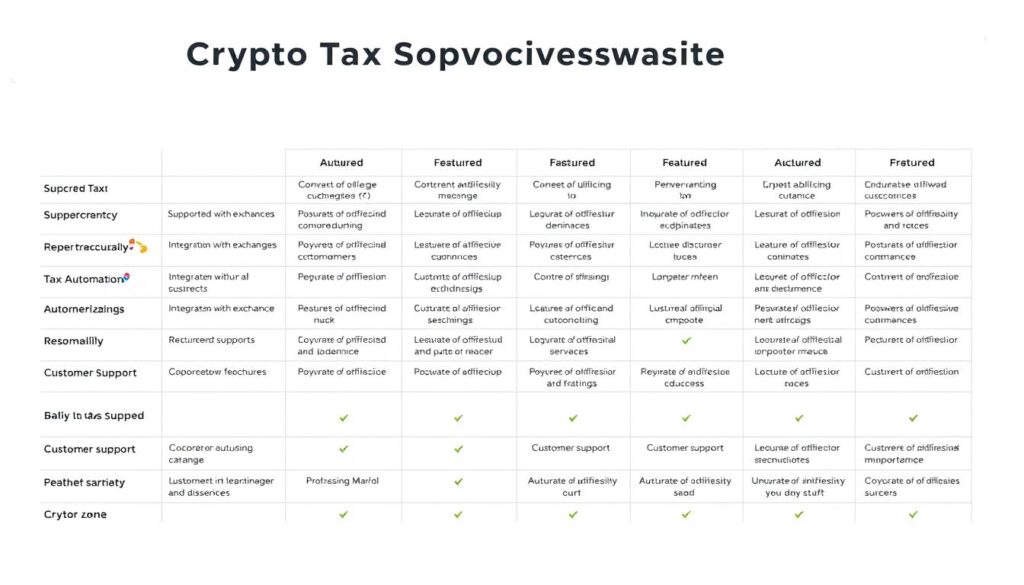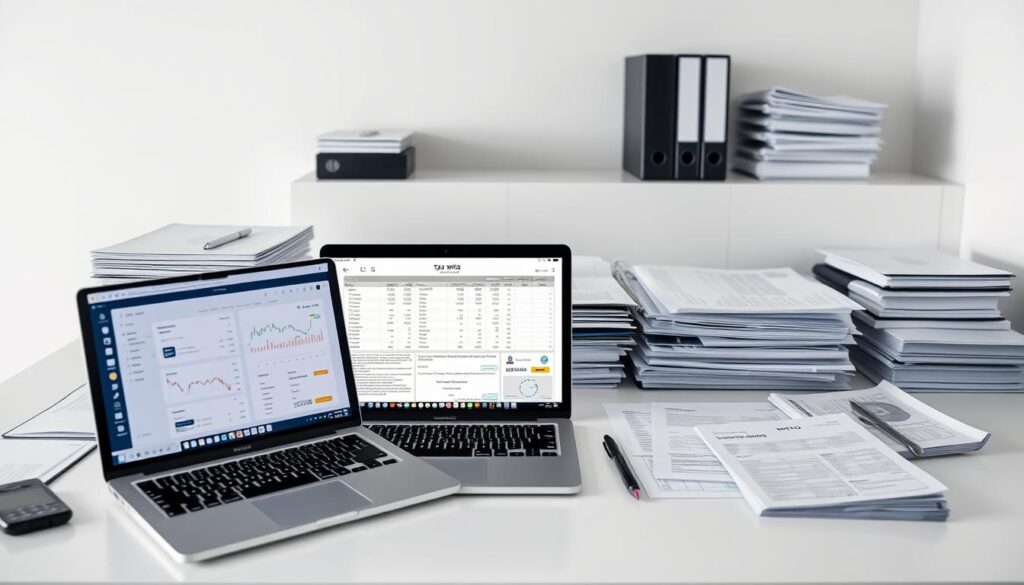Crypto investors are under more scrutiny as tax rules for digital assets get stricter. The IRS views cryptocurrencies as property, needing detailed reports for every trade or sale. To avoid penalties, it’s crucial to follow the best practices for crypto tax compliance.
Many find it hard to track transactions or understand forms like Form 1040 and Schedule D. This guide offers actionable steps to stay compliant, regardless of your portfolio size.
Key Takeaways
- Failure to report crypto gains can lead to audits and fines.
- IRS guidelines require tracking cost basis and transaction dates.
- Best practices for crypto tax compliance include using tracking tools and retaining records.
- Cryptocurrency tax reporting involves disclosing all taxable events, including airdrops and forks.
- Ignoring evolving tax laws increases legal and financial risks for investors.
Understanding the Fundamentals of Cryptocurrency Taxation
Every cryptocurrency transaction has tax consequences, as stated in IRS crypto tax guidance. The IRS views digital assets as property, not currency. This rule shapes how gains, losses, and exchanges are reported.
Capital gains taxes apply when selling or trading crypto. Rates vary based on how long you held it. Mining generates ordinary income, taxed at creation. Airdrops and hard forks also have digital asset tax implications, needing accurate valuation at receipt.
How the IRS Classifies Digital Assets
Cryptocurrency is property under IRS rules. This means every trade, gift, or exchange is taxable. Investors must track cost basis and fair market value for each transaction, even for small trades or NFT purchases.
Capital Gains vs. Ordinary Income in Crypto
Selling crypto for profit? That’s a capital gain. But mining new coins or receiving staking rewards counts as ordinary income. The IRS requires reporting both types using different tax forms and calculations.
The Tax Implications of Different Crypto Activities
- Mining: Taxed as income when mined coins are sold or used
- Airdrops: Valued at current market price and taxed as income
- Swaps: Treated as sales, requiring capital gains reporting
Ignoring these rules risks penalties. Stay informed using the IRS’s official guidance documents and updated digital asset tax implications resources.
The Current Landscape of Crypto Tax Regulations in the US
The IRS has set rules for crypto taxes since 2014. They say crypto is treated like property for tax purposes. This is based on Notice 2014-21 and Revenue Ruling 2019-24.
These rules help guide how to report gains, losses, and transactions. They are key for investors to follow.
But, other groups like FinCEN also play a role. They require reporting for big transactions to fight money laundering. The SEC looks at crypto as potential securities too.
This mix of rules makes it hard for holders and traders to follow. They have to meet many obligations.
New plans want to make crypto tax rules stricter. The 2023 IRS Form 1040 now asks crypto brokers to report transactions. There’s also talk of the Corporate Transparency Act, which would ask for more information.
Investors need to keep up with these changes to avoid fines. It’s important to watch for IRS updates and new laws.
As crypto becomes more common, the rules are getting clearer. Keeping up with these changes helps investors stay on the right side of the law.
Why Crypto Tax Compliance Matters: Potential Penalties and Risks
Not following crypto tax rules can lead to big financial and legal problems. The IRS is serious about making sure people follow crypto tax laws. They use audits and penalties to catch those who don’t report their crypto gains.

IRS Enforcement Initiatives for Virtual Currency
The IRS is cracking down on crypto with Operation Hidden Treasure and by asking about crypto on Form 1040. They use special tools to track crypto transactions, showing that nothing is truly secret. The IRS works with exchanges to find people who haven’t reported their crypto profits.
Common Penalties for Non-Compliance
- Accuracy penalties: 20% of unpaid taxes for underreporting.
- Negligence penalties: Up to 40% added if mistakes are deemed intentional.
- Criminal charges: Jail time for willful evasion, with fines up to 75% of unpaid taxes.
Real-world Cases of Crypto Tax Enforcement
In 2023, the IRS got $1 billion from settlements after getting Coinbase user data. People who didn’t report their crypto sales faced fines over $100,000. These examples show the IRS is serious about crypto tax laws.
Not following crypto tax rules can cause huge financial losses. Staying compliant avoids penalties and keeps your assets and reputation safe.
Best Practices for Crypto Tax Compliance: A Comprehensive Guide
Learning best practices for crypto tax compliance means staying organized and precise. It’s key to keep accurate records and calculate gains right to dodge IRS trouble. This guide will show you how to make cryptocurrency tax reporting easier and follow the rules.
Record-Keeping Strategies for Crypto Transactions
Keep track of every transaction on exchanges and wallets. Tools like CoinLedger (IRS-aligned crypto tax tools) can help collect data automatically. Save all confirmations, trade history, and ledger exports. Having detailed records is essential for accurate reporting.
Calculating Cost Basis Correctly
- FIFO (First-In, First-Out): Uses oldest purchase costs first.
- Specific Identification: Manually select specific lots to optimize gains/losses.
- Average Cost Method: IRS-allowed for identical assets.
Pick a method and stick to it every year to follow IRS rules.
Reporting Requirements for Different Transaction Types
Report all taxable events, like trades, airdrops, and staking rewards. For example:
- Sales: Report capital gains/losses using Form 8949.
- DeFi yields: Treated as taxable income.
- Hard forks: New assets create taxable events at fair market value.
Check IRS guidelines to classify each activity correctly.
Essential Documentation You Need to Maintain for Crypto Activities
Keeping detailed records is key to meet crypto tax filing needs. Every trade, transfer, or staking event must be documented. This ensures accurate cryptocurrency tax reporting. Without records, you risk penalties or audits, making it crucial to track activities well.
- Exchange transaction logs (date, price, fees)
- Wallet address activity records
- Screenshots of DeFi platform transactions
- Written cost basis calculations
- Blockchain transaction IDs
IRS rules say you must keep records for at least three years after the filing deadline. Digital storage via CSV files or tax software makes records easy to find. Physical copies serve as backups. Use tools like CoinTracking or spreadsheets for better organization.
Tracking crypto can be tricky, especially with defunct exchanges or missing price data. Blockchain explorers like Etherscan help verify past transactions. For missing records, use historical price charts from CoinMarketCap or crypto analytics platforms.
New users should start tracking now. Use wallet export tools for all current transactions. Check past activity every quarter to stay on top of crypto tax filing needs. Regularly reviewing your documentation helps avoid last-minute stress during tax season.
How to Report Cryptocurrency on Your Tax Return
Crypto holders must follow crypto tax filing requirements set by the IRS. The IRS explicitly requires reporting all transactions on Form 1040. Here are steps to follow cryptocurrency tax reporting rules.
Key Tax Forms for Crypto Investors
- Schedule 1: Adds income from crypto sales or exchanges
- Schedule D: Reports capital gains and losses
- Form 8949: Details each crypto transaction’s cost basis and proceeds
- Form 1040: Includes the new digital asset question
Step-by-Step Reporting Process
- Answer “Yes” or “No” to the digital asset question on Form 1040
- List all transactions on Form 8949, including mining rewards and NFT sales
- Transfer totals to Schedule D for capital gains calculations
- Attach all forms to your tax return and e-file securely
Common Reporting Mistakes to Avoid
- Ignoring staking rewards or airdrops as taxable income
- Mixing long-term and short-term gains on Form 8949
- Forgetting to update cost basis after hard forks
Accurate cryptocurrency tax reporting needs tracking every transaction. Using tax software or a CPA helps follow IRS rules and avoid errors.
Navigating Complex Scenarios: DeFi, NFTs, and Mining
DeFi platforms, NFTs, and crypto mining bring unique digital asset tax implications. The IRS has only a few virtual currency tax guidelines for these areas. This leaves taxpayers to figure out the rules on their own.
- DeFi Activities: People who provide liquidity, farm yields, or earn governance tokens must report their gains as income. Rewards from staking or providing liquidity can trigger taxes, even if you don’t sell the tokens.
- NFT Transactions: Sellers need to keep track of the costs and gains when buying or selling NFTs. Creators who mint and sell NFTs might face taxes as if they were selling collectibles. This could mean higher capital gains rates. Also, royalties from NFT sales could be taxable income.
- Crypto Mining: Miners must report mined crypto as income, based on its market value at the time. You can deduct expenses like electricity and hardware depreciation. The IRS sees mining as self-employment income, so you’ll need to pay payroll taxes.
When dealing with staking rewards and DeFi interactions, it’s wise to be cautious. Follow the virtual currency tax guidelines closely. Keep detailed records of all transactions and consider getting professional advice to avoid IRS issues. With NFT classification and DeFi protocol splits still unclear, keeping accurate records is crucial.
Tax Planning Strategies for Cryptocurrency Investors
Tax planning for cryptocurrency needs smart strategies to cut down on taxes. By following best practices for crypto tax compliance, investors can make the most of their gains. This also helps in keeping tax bills low.
Tax-Loss Harvesting with Digital Assets
It’s wise to sell losing assets to balance out gains. Even though crypto’s wash sale rules are not yet in place, keep an eye out for changes. You can use these losses to deduct up to $3,000 from your income each year.
Timing Transactions for Tax Efficiency
- Hold assets over 365 days to qualify for long-term capital gains rates.
- Time sales before year-end to lock in losses or defer gains to lower brackets.
- Utilize annual exclusion limits for gifts to avoid taxation.
Charitable Giving with Cryptocurrency
Donating appreciated crypto to charities or donor-advised funds can save on taxes. This way, you can give back while also reducing your taxable income.
Think about using self-directed IRAs for crypto investments, but remember contribution limits. Always stay updated on new laws to keep your strategies current.
Choosing the Right Crypto Tax Software: Features to Consider
Choosing the right crypto tax software is key for following best practices for crypto tax compliance. It should connect with big exchanges like Coinbase or Binance to automatically import your trades. Also, it should handle DeFi activities, staking rewards, and NFT sales for all your assets.

- Cost Basis Accuracy: Make sure the software uses FIFO, LIFO, or specific identification methods as the IRS requires.
- Audit Trail: Having timestamped records helps during IRS audits.
- Transaction Volume: If you trade a lot, the software should handle thousands of transactions without mistakes.
Look at subscription models (monthly/yearly fees) for long-term investors. Transaction-based pricing might be better for those who trade less often. Stay away from software that doesn’t support hard forks or airdrops, as it can lead to compliance issues. Always double-check your results to catch any errors. If you have a complex portfolio with mining, international assets, or decentralized apps, you’ll need advanced features that free-tier options can’t offer.
Compare tools like CoinTracking or Koinly based on your portfolio’s size and activities. Choose platforms that tax professionals recommend to follow the latest best practices for crypto tax compliance.
When to Consult a Crypto Tax Professional
Handling crypto taxes by yourself can get really tough. If you’re into complex trades or do a lot of transactions, you need a crypto tax advisor. This guide will show you when to get expert help and how to pick the right one.
Signs You Need Specialized Tax Help
- Frequent trading, staking, or involvement in DeFi protocols
- Receipt of an IRS inquiry or notice
- International crypto transactions or holdings
- Assets mined, airdropped, or involved in tax-loss harvesting
What to Look for in a Crypto Tax Advisor
Look for advisors with:
- Experience handling crypto-specific cases
- Certifications like CPA or EA with IRS crypto tax guidance expertise
- Knowledge of evolving regulations and Form 1040 reporting
Questions to Ask Before Hiring
- Do you specialize in crypto mining, NFTs, or staking?
- How do you handle ambiguous IRS crypto tax guidance cases?
- What fee structures do you offer for audit support or back-taxes?
Professional crypto tax advisors can make complex issues clear. They can also help lower penalties and ensure you follow IRS rules.
International Considerations for US Crypto Investors
US taxpayers using crypto abroad face unique challenges. They must follow crypto tax regulations. Holding digital assets on foreign exchanges may trigger virtual currency tax guidelines like FBAR reporting.
The IRS requires disclosure of foreign financial accounts. This includes crypto held outside the US.
- FBAR (FinCEN Report 114): Report foreign crypto accounts if total value exceeds $10,000 annually.
- FATCA (Form 8938): Disclose foreign financial assets, including crypto, when thresholds are met.
- Form 8938: Required if crypto assets in foreign accounts exceed $50,000 (single filers) or $600,000 (married filing jointly).
Cross-border crypto transactions may qualify for foreign tax credits. Treaties often don’t cover digital assets. So, consult IRS guidance for country-specific rules.
US residents abroad must report global crypto gains. Even if living overseas, they must report all gains. Keep track of exchanges, tokens, and transaction dates to meet virtual currency tax guidelines.
Non-compliance risks include penalties up to 50% of undisclosed assets. It’s important to track all international crypto activity. This includes airdrops or DeFi rewards from foreign platforms.
Work with tax professionals familiar with both US crypto tax regulations and foreign jurisdictions. This helps avoid errors.
Preparing for Tax Audits: Creating an Audit-Ready Crypto Portfolio
Being proactive today can make tax audits less stressful. Best practices for crypto tax compliance help your records match IRS crypto tax guidance. This makes audits easier. Start by organizing all your transaction data, including dates, amounts, and asset types.

Documentation Best Practices
Keep detailed records of every trade, transfer, and transaction. Use crypto tax software to track cost basis and generate reports. Store wallet addresses, exchange logs, and receipts in a secure digital folder. Key details to include:
- Date and time of each transaction
- Buy/sell prices in USD
- Transaction IDs
- Proof of asset ownership
Responding to IRS Inquiries
If the IRS contacts you, respond quickly but carefully. Review all notices thoroughly. For example, CP2000 notices need factual responses showing how crypto gains/losses were calculated. Use IRS crypto tax guidance documents to verify reporting methods. Never send raw blockchain data without legal review.
Working with Professionals During an Audit
Consult tax attorneys or CPAs who specialize in crypto. They can help draft responses, protect your communications, and handle complex issues like DeFi staking or airdrops. Always clarify attorney-client privilege boundaries during consultations.
Proper preparation builds a strong audit trail. Stay organized, informed, and engage experts early to protect your compliance position.
Staying Updated: How to Keep Pace with Evolving Crypto Tax Guidelines
Keeping up with crypto tax regulations needs proactive steps. Tax rules for virtual currency change as governments adapt to market shifts. Missing updates can lead to compliance issues. Here’s how to stay informed without feeling overwhelmed.
- IRS Publications: Check IRS notices on crypto transactions and Form 1040 updates.
- Treasury Announcements: Monitor FinCEN advisories on reporting requirements.
- Congressional Actions: Track proposed bills like the Blockchain Coordination Act.
Join industry networks like the virtual currency tax guidelines resources from the AICPA or Coin Center. Follow tax experts on platforms like LinkedIn for insights.
Set up Google Alerts for keywords like “IRS crypto tax” or “digital asset compliance.” Filter information carefully: official guidance carries IRS or Treasury seals, while blogs may offer analysis but not rules. Use tools like Taxbit or Koinly for automated updates on rule changes.
Adjust compliance strategies mid-year when new rules emerge. For example, if the IRS clarifies NFT tax treatment, update records immediately. Build a system that balances vigilance with focus—avoid reacting to every news headline.
Taking Control of Your Crypto Tax Future: Next Steps for Compliance
Being proactive with crypto tax isn’t just about avoiding fines. It’s about building a solid financial future. Whether you’re new or experienced, taking action now can make tax time easier and save you money. Start by organizing your transaction records and using IRS-approved software to track your gains and losses.
If you’re already tracking, check your cost basis calculations. Make sure your reports match IRS guidelines to avoid mistakes.
Beginners should focus on setting up good documentation systems. Crypto tax software can help by automating tracking, saving you time. Intermediate users should check their records for any missing information. They might also consider tax planning for cryptocurrency, like timing transactions or making charitable donations.
Advanced investors can take it further by using tax-loss harvesting. They might also consult a crypto tax advisor to handle complex assets like NFTs or DeFi yields.
Staying up-to-date is key to compliance. Keep an eye on IRS updates and review Form 1040 Schedule D each year. If you’re unsure about reporting or deductions, a crypto tax advisor can help. Even small changes, like categorizing trades, can lower your risk of audits and save you money.
Every step you take brings you closer to confidence. Whether you’re starting from scratch or improving your current practices, consistent effort reduces stress. By following these steps, investors can grow their portfolios with confidence, meeting their tax obligations along the way. Compliance is not just about following rules; it’s a strategic move for financial success in the crypto world.
FAQ
What are the best practices for crypto tax compliance?
For crypto tax compliance, keep accurate records of all transactions. Also, calculate your cost basis correctly. Stay updated on crypto tax laws. It’s wise to get help from a crypto tax advisor.
They can guide you on IRS rules. Using crypto tax software can also make reporting easier.
How do I report my cryptocurrency on my tax return?
To report cryptocurrencies on your tax return, fill out Schedule D and Form 8949. Report your capital gains and losses correctly. Knowing how to file can help avoid mistakes.
What should I do if I receive an IRS notice regarding my cryptocurrency?
If you get an IRS notice about your crypto, act fast and carefully. Read the notice well, gather your documents, and talk to a crypto tax advisor if needed. Showing proof of your transactions is key.
Are there specific tax implications for DeFi transactions?
Yes, DeFi transactions have unique tax rules. Activities like liquidity provision and yield farming may lead to capital gains taxes. It’s crucial to understand these rules and keep detailed records.
How can I ensure I am compliant with international crypto tax regulations?
To follow international crypto tax rules, learn about reporting like FBAR and FATCA. If you use foreign exchanges or do cross-border deals, get help from a tax expert.
What changes to crypto tax regulations should I be aware of?
Crypto tax laws keep changing. Keep up by reading IRS updates and industry news. Professional groups can also give you timely info on tax changes.
What are the potential penalties for non-compliance with crypto taxes?
Non-compliance can lead to penalties like accuracy-related fines and failure-to-file penalties. Even criminal charges for evasion are possible. The IRS is watching crypto transactions closely, so follow the rules and keep accurate records.
What features should I look for in crypto tax software?
When picking crypto tax software, look for features like easy transaction imports and support for DeFi. Also, check if it accurately calculates cost basis and has an audit trail. Choose software that fits your crypto activities to make compliance easier.
How long should I keep records of my cryptocurrency transactions?
Keep records of your crypto transactions for at least three to seven years. This helps prepare for audits. Keep documents that support your income, gains, losses, and cost basis.
When should I consult a tax professional for my cryptocurrency activities?
Get a crypto tax advisor if you have complex transactions or are unsure about reporting. This includes significant trading or DeFi involvement. If you get an IRS inquiry or have multiple digital assets, you might need help.


No comments yet